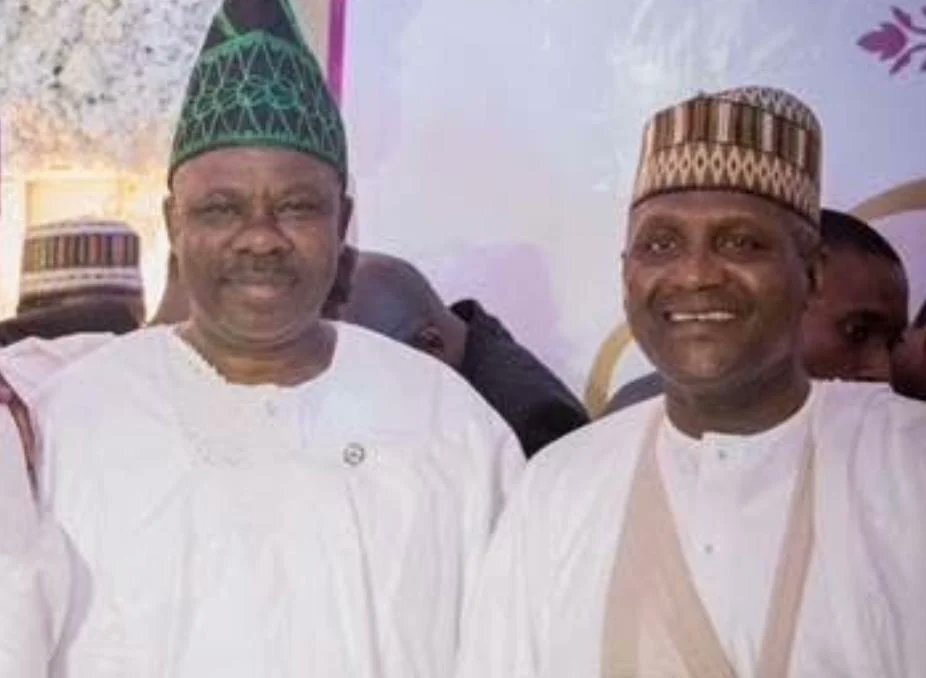Aliko Dangote, chairman of Dangote Group, has alleged that his cement factory in Itori, Ogun state, was demolished twice during the tenure of Ibikunle Amosun, former governor of the state, forcing his company to abandon the investment in the area.
Dangote spoke on Monday while on a courtesy visit to Dapo Abiodun, governor of Ogun, at the government house in Abeokuta.
The billionaire announced the reconstruction of the factory and his renewed commitment to investing in Ogun State.
“Our factory at Itori was pulled down twice. When we started the second time, they did not only demolish the factory but also the fence, so we left,” Dangote said.
“But right now, because of His Excellency, our governor, Prince Dapo Abiodun, we are back. When you get to the factory, you will be surprised at what we have done.”
He attributed his return to Abiodun’s investor-friendly policies and support for the private sector, which he said had created a conducive environment for businesses to thrive.
Dangote also announced plans to revive the abandoned Olokola Free Trade Zone (OKFTZ) project and construct the largest port in Nigeria in collaboration with the state government.
He further said two new lines of a 6.0 million metric tonnes per annum cement plant had been constructed at Itori, adding to the existing 12 million metric tonnes per annum plant in Ibeshe.
He said it will position Ogun state as the largest cement-producing hub in Africa.
“With the contributions of other cement producers in the state, Ogun remains far ahead of other countries across Africa in terms of cement production,” he said.
Dangote also said investment in the manufacturing of the product had made the nation self-sufficient in cement, just as the country is now self-sufficient in fertilizer with the surplus going for the export market thus earning the nation the needed foreign exchange.
In his reaponse, Abiodun, appreciated Dangote for coming back to Ogun state and also for his belief and trust in the country, Nigeria.
“I want to thank you for all that you have done, the number of people that you have employed, the impact you continue to make not just in this state, but Nigeria as a whole,” the governor said.
“The way you selflessly continue to promote this country all over the world, we can’t thank you enough. Your life and story continue to be an inspiring narrative to all young men. You have excelled in everywhere you touch, you have the Midas touch.
“Not only have you chosen to complete Itori, you have chosen to come back and develop the biggest port in Nigeria. For this, I thank you.”
‘PROVIDE PROOF OF APPROVALS’
In a statement responding to Dangote, Lanre Akinwale, media office of the former governor, dismissed the claims, insisting that the business mogul should provide evidence of requisite approvals for the structures allegedly demolished.
The office questioned whether Dangote had obtained the necessary government permits before commencing construction and emphasised that no individual or business entity could operate outside the law.
“It is on this basis that we want to appeal to Alhaji Dangote to avail the public of the requisite approvals for the construction of the structures he alleged were demolished,” the statement reads.
“This will, at least, help the public to put the issue in proper context and for us to know what exactly his grouse is.”
Adewale also highlighted that during Amosun’s tenure, Ogun state became the “Industrial Capital of Nigeria,” attracting over 500 companies and accounting for about 75 percent of foreign direct investments (FDIs) in the country’s industrial sector.
He further said Dangote had previously praised the Amosun administration for facilitating the establishment of his Ibese cement factory, after years of frustration under past governments.
“We will not give vent to this obvious mischief, as it is deliberate,” Akinwale said.
“However, we will advise Alhaji Dangote to furnish the public with details of the land acquisition and relevant planning approvals so that we can engage in a constructive conversation.”
Akinwale also rejected any suggestion that the Amosun administration was anti-business, citing World Bank recognition of Ogun as one of the top three states in Nigeria for ease of doing business.









